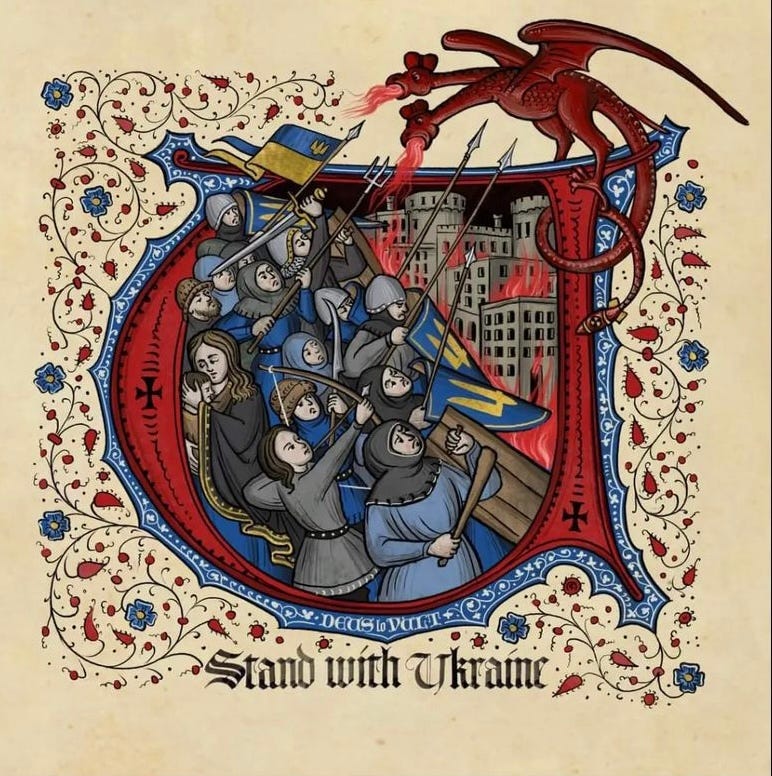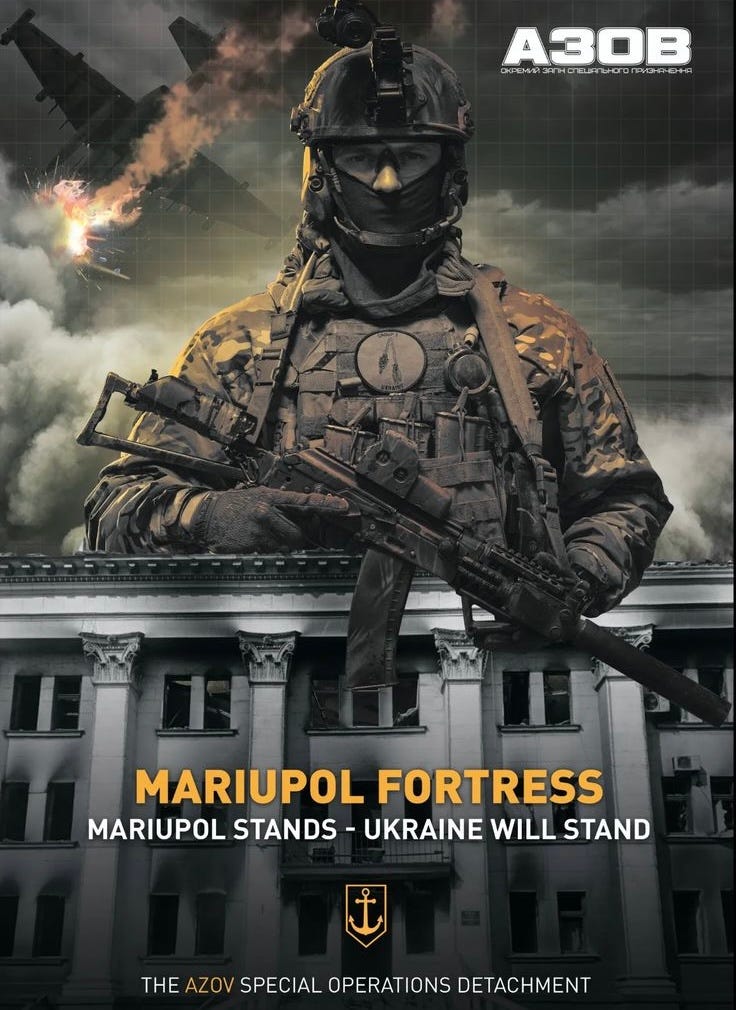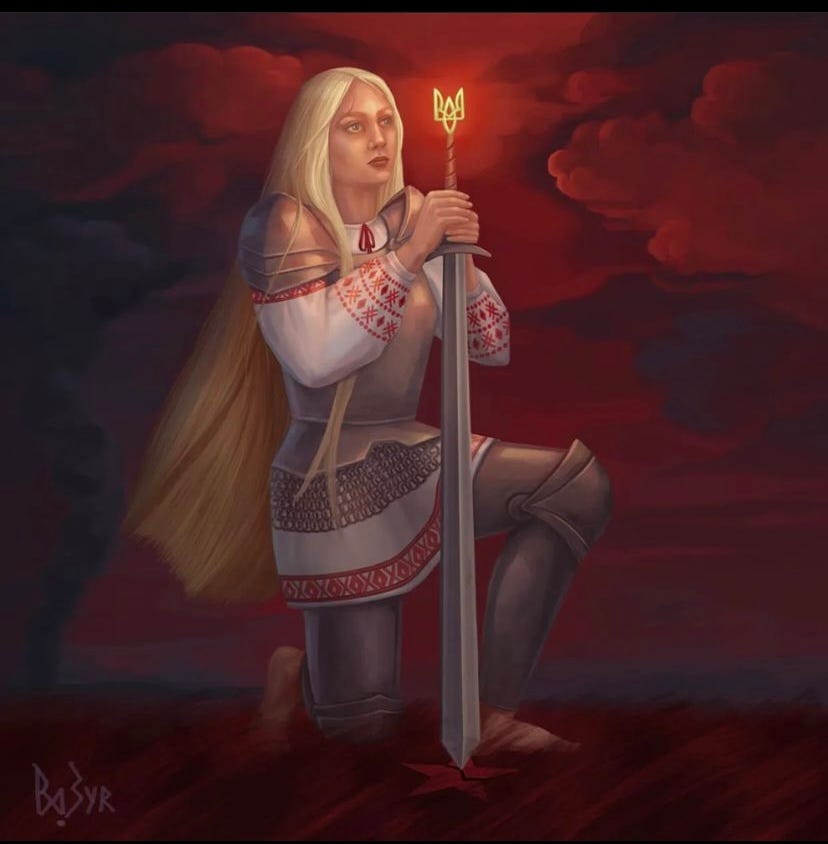The Return of a Really Stupid Myth
Russia, Ukraine, and the "Gates of Vienna"
(images included in this essay are examples of Ukrainian propaganda meant to illustrate the point of the essay. They’re of course not endorsements in any way.)
For the last few decades in Europe, far-right nationalists have relied on an ancient historical moment as a kind of mythic foundation for their opposition to immigration for Muslims. That moment was the invasion of the Mongols, and especially their siege of Vienna.
It isn’t something much discussed in American history books, which skip directly from Charlemagne to the Black Death in medieval discussions. Even in a rather exhaustive medieval history course I took at a university, no reference was given to it. Likely the reason it isn’t mentioned is because the Mongols never got to so-called Western Europe, and since the United States connects its history only to those lands, what happened a bit east of there matters not at all.
I never learned of the matter until adulthood, and I stumbled upon this history by accident. In my early 20’s, I quit my job as a cook and bar back at a nightclub after squirreling away several thousand dollars in cash by reducing my expenses to almost nothing (sleeping on a friend’s couch, sometimes overnight in the club after it had closed), and traveled for my first time in Europe. I stretched the cash out as far as possible by camping in each place I visited rather than staying in hostels or hotels, eating only what I could cook at the campsite, handwashing my clothes in sinks, and taking the cheapest possible transportation to each destination, even if that meant taking seven hours instead of one to get there.
I did splurge on some things, however, including an industrial music festival in Germany on a mountain overlooking the Rhine. The place is called the Lorelei, named after a mythic nymph who would drown sailors with sudden winds, a later naming for a much older myth about dwarfs who would do the same thing.
Industrial music has always been my ‘thing,’ though the older I get the more this feels like a hopelessly nostalgic statement. In my 20’s there were several nightclubs in Seattle devoted to it, and it was popular enough that Germany had six very large industrial music festivals each year. It’s hard to find anything of the sort now, and I think at least part of this is because the terror of an apocalyptic computerised world that genre borrowed as a motif manifested in the softer and more horrific aesthetic of concealed machine dominance.
At that festival, I met a very serious and very fashion-conscious French woman, a thanatopractrice,1 who quickly became my festival companion. She was happy to talk to an American, and had taken from my punk aesthetic (by that point all my clothes were quite torn and smelled of travel and infrequent showering, but I didn’t know how to explain that it wasn’t an intentional fashion choice) and some of our political conversations that we were a kind of kin.
At the end of the festival, she’d recommended a few bands to me, and I picked up CDs from those bands from one of the vendors at the festival. It turned out she was quite astute and had figured out exactly the sort of music I liked, and she also realised that my French wasn’t good enough for me to understand precisely what any of the bands were actually saying.
It wasn’t until much later that I realised I’d spent several hundred euro on ultra-nationalist music, and I discovered this completely by accident. I’d been reading something somewhere, and the writer had referred to “barbarians at the gates of Vienna,” a phrase I’d normally associated with Rome. I didn’t understand the reference, and this was before Wikipedia or the internet in general functioned as a massive short-cut to sounding smart, but eventually I found the reference again in a European history book I’d picked up at a second-hand book store.
The reason this phrase had even caught in my head was because there were multiple references to Vienna by several of the bands my mortician French festival friend had recommended. I never understood why they kept mentioning it, but then I figured it out.
In the early 1200’s, the Mongol Empire conquered all of what is now Russia, Ukraine, Poland, and Hungary. Kiev was completely razed in the year 1240 by Ogedei Khan, and all of Russia remained under vassalage of the Khans into the 15th century. The Catholic kingdoms of Hungary and Poland both fell into ruin for decades after the invasions, leaving an opening for the pagan Grand Duchy of Lithuania to unite the people in the lands that are now under dispute in the Russia-Ukranian war under paganism until 1387.2
Vienna comes into this story because it was the furthest western reach of the Mongols, or just outside of Vienna, in December of the year 1241. Many mythic narratives of that moment arose and persist, because it was at Vienna that the Mongols suddenly withdrew from the lands west of Russia that they had just conquered.
The explanations varied. Some believed it was the power and light of Christ that had finally turned them back. Other stories credited the ferocity of heavily-armored Christian Teutonic knights (who had nevertheless been slaughtered by the mostly unarmored Mongols in Poland earlier that year) at the city. But the truth is that the Mongol khans (chiefs) returned home because Ogedei Khan had just died and they needed to confirm his replacement.
Vienna persisted as a mythic moment throughout the eastern parts of Europe up until the present day. It became part of Teutonic and Polish cultural myth that it was they who had stopped the Golden Horde, both believing they were Christendom’s anointed champions. That mythic belief functioned heavily in the bloody wars the next century to subjugate the Baltic pagans, a crusade that only stopped when the Grand Duke of Lithuania converted to Christianity. Much later, the myth was also woven into early nationalist stories and then into anti-communist propaganda by the German Nazis.
The link between this myth, fascism, and anti-communism is because of another persisting myth about the Russians themselves. The Mongols were not blind killers raping and ravaging every land they touched, but rather quite astute politicians. Where it suited them and where it made the most sense, they allowed local princes and kings to continue on, provided they agreed to send tribute back to their conquerors. The princes who ruled in Russia until the 15th century, for example, were those who had chosen this arrangement rather than watching their peoples annihilated and their lands razed.
Though subsequent rulers in Russia were not inheritors of those arrangements and were able to seize power specifically because the Golden Horde was no longer a threat, the association of Russia with the Mongols nevertheless persisted and became a very useful trope. Especially after the overthrow of the Tsar and the foundation of the Soviets, anti-communists quickly employed the conflation of the two groups of people to elicit populist and nationalist rage against the USSR. Nazis made particularly good use of this trope, but after World War II it mostly disappeared until now.

The birth of the European Nouvelle Droit revived interest in the “gates of Vienna” trope, but for them the new Mongols were the Muslims and the Communists, but not specifically the Russians. Foundational to that narrative is that Europe has always existed as a thing both collective and mythic, and in their imaginations Europe also included Russia. Russia was only separated from that commonality on account of communism, which is why after the fall of the USSR so many arguments were made to regularise relations between Western Europe and the Russians.
The real enemy for them was Islam, which falsely and ironically became equated with the Mongols. The Mongols were in truth an animist people and not at all Muslim, and their religious views had much more in common with those of pre-Christian Europe (including the Baltic pagans of the Grand Duchy of Lithuania) than any monotheist religion. Despite this, Muslims in Europe became the new Mongols in the ultra-nationalist mind, a conquering people raping the land and good people of Europe.
I hadn’t thought much on these associations for over a decade now, as I had thought this mythic narrative had fallen out of favor in Europe. It had, mostly, at least until the Russian-Ukrainian war:
Over years on social media, I’d been connected to quite a few of accounts of Ukrainians, primarily on Instagram.3 Those accounts fall roughly into three categories: artisans, musicians, and gay guys. My primary interest in the first two groups overlapped with pagan interests, as Slavic paganism has been re-surging significantly in the last decade. The third? Well, come on—I’m a gay dude.
Once the war started, I began checking in regularly with these accounts. They’re all still in Ukraine, still alive and active, and of the accounts still regularly posting, only one of them isn’t constantly sharing official AZOV propaganda.
It’s been interesting to watch this transition. Some of them were quite clearly leftists and two were anarchists, but they’ve gone full-on ultra-nationalist now that their homeland has been invaded. I’m not judging, really. I’d like to think I’d retain a general sense that no one deserves to be shot, but if the village I live in was bombed by Biden, I can’t be sure I wouldn’t be screaming for the death of all Americans.
It makes sense they’d slip into this really façile and tragic position, because Naomi Klein’s “shock doctrine” theory really holds true. They’re terrified, I get it.
Still, what’s both worrisome and fascinating is to see phrases like “Mariupol is Vienna,” “kill the Golden Horde,” “Ukraine is Europe’s Shield,” and “AZOV are Europe’s holy knights.” The picture I posted above is by an artist shared by many of these accounts, and there are now many bands re-working old Ukrainian folk songs with lyrics about fighting the Mongols.
Several AZOV-affiliated accounts have produced English and German explanations for people of the “true” origins of Russia. I’ve read through quite a few of these, and they all repeat the same conspiratorial belief that Russians are all Mongol bastards (literally the offspring of Mongol rape of Slavic women). Some of these include warnings to Germans in particular to expel Russians from their lands, because Russians will rape German women because they’re actually Mongols, not Europeans.
All told, I’ve seen hundreds of accounts posting this nonsense. It’s very difficult to determine how widespread such beliefs are through social media accounts because of algorithms, but I’m starting to hear echoes of these ideas in other places. For instance, there have been multiple but small protests by Russian immigrants in Germany and France against their treatment by locals since the war began, protests which were met soon after with massive pro-Ukraine protests with anti-Russian rhetoric in many of the banners and slogans.

I’m worried, because I think this will soon be a much larger thing here. I suspect we’ll see anti-Russian sentiment become a kind of default centrist position in Europe the way that anti-Russian sentiment is a default establishment Democrat position. This is precisely how you manufacture consent for a future war, how you create the narrative framework that dehumanizes an entire people group so much so that killing them doesn’t feel like killing at all.
I’m also thinking again on Jung’s essay, “Wotan.” Nothing else I’ve ever read explains better the way a myth can seize people and become part of their sense of collective identity. It’s hard not to fear something like this will happen again in Europe, especially the more Liberal Democracy crumbles and the people within it believe themselves to be defending the gates of civilization against barbarians everywhere.
Mortician, probably the most goth job of anyone at that festival.
Yeah, paganism continued politically into at least the end of the 14th century. The past is not as past as we are often told.
Of all the social media sites I used, it always felt like the least politically and mentally exhausting, though of course it’s not that way any longer.






thanks for continuing to be a champion of the underdog narrative. this wholly resonates with me. The general behavior of everybody is fucked right now and so I look to my own house.
Thanks for this essay. We are seeing many rather useless myths come out of some frothy swamp of prejudices. The propaganda being churned out in the West only makes the frothy swamp all the more fertile.
First, as someone of Lithuanian descent, I am always amused at how stubbornly pagan they were. And still are? What is it with all of that bee lore?
The propaganda coming out of Ukraine is going to be counterproductive, yet Western media workers are lapping it up. Facebook is already full of Americans commenting on how the Azov and adjacent brigades just aren't all that bad.
LaStampa has already tried to pin a massacre in Ukraine on "Asiatic soldiers," the Mongols or the Huns under a different adjective.
And the outright racism welling up is, eerrrrrr, disconcerting. LaStampa regularly uses photos of distressed blond children in Ukraine. There has actually been in article on stranded babies from surrogate mothers--if you think that the West hasn't exploited Ukraine enough, read up on surrogate mothers as an industry there.
If there is such a thing as pornography (and that's another debate), using blond kids to appeal to people's racism so as to expand a war is pornography.
I'm so old I recall when Alan Kurdi washed up on the beach in the Aegean. Poor kid. Brown hair.